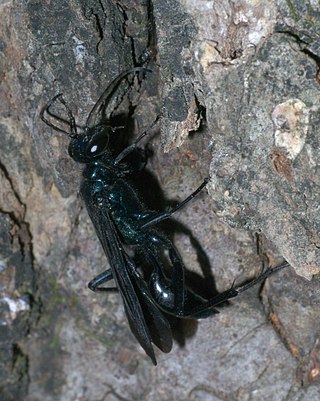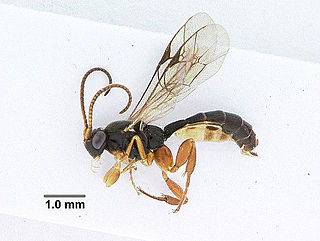
Chalcid wasps are insects within the superfamily Chalcidoidea, part of the order Hymenoptera. The superfamily contains some 22,500 known species, and an estimated total diversity of more than 500,000 species, meaning the vast majority have yet to be discovered and described. The name "chalcid" is often confused with the name "chalcidid", though the latter refers strictly to one constituent family, the Chalcididae, rather than the superfamily as a whole; accordingly, most recent publications (e.g.,) use the name "chalcidoid" when referring to members of the superfamily.

The Pteromalidae are a large family of wasps, the majority being parasitoids of other insects. They are found throughout the world in virtually all habitats, and many are important as biological control agents. The oldest known fossil is known from the Early Cretaceous.

The Ormyridae are a small family of parasitic wasps in the superfamily Chalcidoidea. They are either parasitoids or hyperparasitoids on gall-forming insects, primarily cynipid wasps and tephritid flies. The 120 or so species are cosmopolitan, except almost entirely absent from South America.

Sceliphrinae is a subfamily of thread-waisted wasps in the family Sphecidae. There are about 6 genera and at least 140 described species in Sceliphrinae.

Telenominae is a subfamily of parasitoid wasps in the family Scelionidae. It was previously considered a subfamily of Platygastridae.

Macroglenes is a genus of chalcidoid wasps in the family Pirenidae. There are at least 20 described species in Macroglenes.

Megachile pseudobrevis, the southeastern little leaf-cutter bee, is a species of hymenopteran in the family Megachilidae.

Orthocentrinae is a subfamily of ichneumon wasps in the family Ichneumonidae. There are at least 29 genera in Orthocentrinae.

Pteromalus is a genus of pteromalids in the family Pteromalidae. There are at least 430 described species in Pteromalus.

Rhyssinae is a subfamily of parasitoid wasps in the family Ichneumonidae. It contains eight genera and 259 described species, but there are likely many undiscovered species.

Vespula vidua, known generally as the long yellowjacket or widow yellowjacket, is a species of stinging wasp in the family Vespidae.

Haltichellinae is a subfamily of chalcidid wasps in the family Chalcididae.

Lithurginae is a subfamily of woodborer bees in the family Megachilidae.
Oraseminae is a subfamily of chalcid wasps in the family Eucharitidae. There are at least 10 genera in Oraseminae.
Eriaporinae is a subfamily of chalcid wasps in the order Hymenoptera, family Pirenidae. There are 2 genera and 6 described species in Eriaporinae.

Pelecinellidae is a small family of chalcidoid wasps, formerly treated as the subfamily Leptofoeninae within Pteromalidae. They, like many small chalcidoids, are brilliantly metallic.

Cleonymidae is a parasitic wasp family formerly treated as a subfamily within Pteromalidae.

Ceidae is a small family of chalcid wasps, previously classified as subfamily Ceinae, in the polyphyletic family Pteromalidae. These wasps are parasitoids of other small insects. Hosts are known only for Cea pulicaris and Spalangiopelta alata.

Cerocephalidae is a small family of chalcid wasps, previously classified as subfamily Cerocephalinae, in the polyphyletic family Pteromalidae. Most species are parasitoids of small wood-boring beetles.

Systasidae is a family of chalcidoid wasps. In 2022, this family was described based on an analysis of a combination of molecular, morphological, and life history data.


















